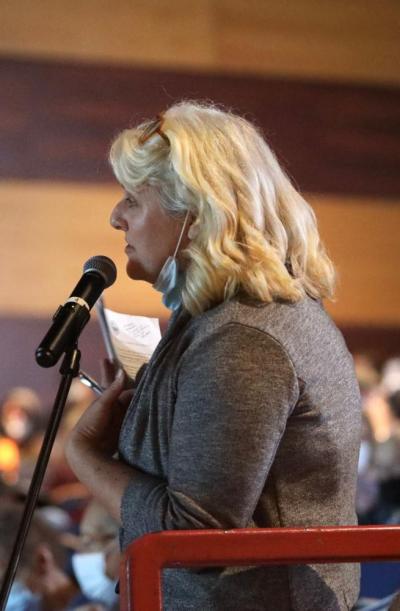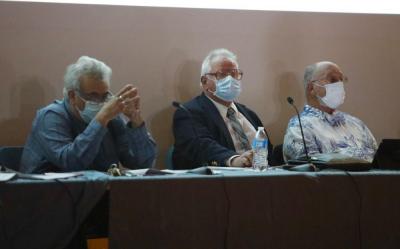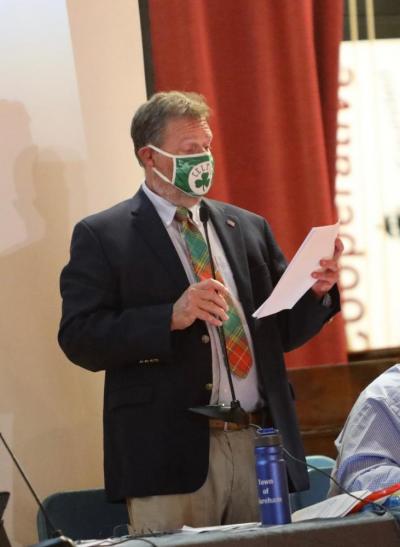Town Meeting passes all articles: Community center, playground funding approved
In a Town Meeting lasting nearly three hours, voters ultimately passed all 20 items that were up for consideration.
The Oct. 25 meeting, which attracted more than 150 voters, was not without controversy. As a number of speakers — both government officials and voters — noted, there has been recent distrust between the government and the people in Wareham. The two groups seem completely at odds, as in June when a record number of voters turned up to Town Meeting to vote down a rezoning effort that was backed by many town officials.
On Monday night, a citizens’ petition that would mandate Zoom meetings passed by a majority vote after both the Select Board and Finance Committee voted against recommending it.
Two further petitions seeking to limit the influence of the Select Board over the Town Meeting warrant and increase citizens’ power over the Redevelopment Authority were passed by a majority of voters.
A citizens’ petition urging the Select Board to review its enforcement of earth removal bylaws was passed by a vast majority.
In addition, voters approved a number of items included in a consent agenda, all of which were related to routine business like budget transfers and the PEG Access Receipts, which fund WCTV.
The town’s capital plan, approved unanimously, includes large purchases and improvements to town properties. Items funded by voters include three school buses, two cruisers and weapons for police, repairs to the Town Hall auditorium, a study of the Onset Pier and new parking kiosks for Onset.
Both projects requesting Community Preservation funds, which can only be used for certain purposes, were approved by Town Meeting attendees.
The effort to build a new playground in Swifts Beach was given $250,000 by a unanimous vote. The funds will pay for accessible playground equipment and surfacing, a new basketball court with backboards and rims, and a new pickleball court.
A majority of voters approved spending $150,000 on the restoration of the stone pier at Wickets Island. Those funds will cover one-third of the total project cost, the rest of which will be paid for by the Buzzards Bay Coalition, which owns the land. Kat Garofoli, the director of the coalition’s Onset Bay Center, explained that the restoration will expand access to the island and allow visitors and first responders alike to safely dock at the pier.
The five citizens’ petition articles prompted the most debate during the meeting.
Future of the Decas School
Voters unanimously approved a modified proposal to reuse the soon-to-be-vacant John W. Decas Elementary School as a community center. After town officials expressed concerns about the original article, an amended motion was presented to voters. It will create a steering committee and set aside $15,000 for a feasibility study.
Muriel Slaney, who said she’s been involved with the Council on Aging for years, said that a multi-generational community center would be a great opportunity for the town’s seniors. She noted that the Multiservice Center — where the Council on Aging is currently located — is not very accessible, particularly when the elevators break down.
Slaney said that despite the hard work of the council, many of Wareham’s seniors travel to the senior centers in Bourne and Marion. New space could bring those seniors back.
Neal Sullivan, an Onset resident, said the project was “very worthy,” but said he had concerns about whether it was the best way to spend the town’s limited funds, especially because the town needs a new police station and water treatment plant.
He said the long-term costs needed to be examined, emphasizing the need for a financial plan for the community center.
Leslie Edwards Davis, the article’s lead petitioner, said that those behind the effort have already secured letters of interest from the South Shore Community Action Council and the Family Pantry at Damien’s Place. Rent from those organizations, she said, would cover the cost of utilities and internet for the whole building.
Enforce earth removal policy
A majority of voters supported a call for the town to enforce its existing earth removal regulations.
In most instances, if earth is removed from town, entities are supposed to clear that removal with the Select Board, obtain a permit and pay the town 25 cents (or more) per cubic yard removed. There are some exemptions to the bylaw that allow earth removal without a permit, such as for “normal construction” or agricultural use.
“The purpose of this referendum is to urge — not demand — that the Selectmen enforce our existing earth removal bylaw,” explained Barry Cosgrove, the article’s lead petitioner. “Why? Because the bylaw is a very valuable tool. It’s an opportunity to raise revenue for the town, cut expenses for the town and protect environmental matters.”
Town Moderator Claire Smith chose not to allow discussion on the article, which she said was essentially a referendum.
The article passed with a strong majority — despite a smattering of “no” votes.
Zoom meetings
An effort to guarantee remote access to meetings and to prohibit board members from blocking citizens from participating during the citizens’ comment portion of many board meetings was passed by a majority vote, 110-59.
Before and during the meeting Monday night, various members of the town’s Select Board and Finance Committee said they were concerned that WCTV would not have the necessary staff to make all meetings hybrid.
In addition, Zoom meetings are currently allowed under an emergency order by Gov. Charlie Baker. When that order lapses, Attorney Richard Bowen explained, a requirement for Zoom participation in meetings might be in conflict with state open meeting law. Bowen said he believes it is likely that the Attorney General will strike down the portion of the article that would prohibit board chairs from blocking citizens from participating in many board meetings. A similar effort out of a Town Meeting in Dedham, MA, was thrown out in 2014, he said.
Diane Kenney, speaking in support of the article, said she didn’t understand why WCTV would be needed to offer hybrid in-person and Zoom meetings.
Kenney added that the current policy of refusing to let those who have sued or who have publicly discussed suing the town participate in public meetings “is one of the main reasons why there is that mistrust and divisiveness” in Wareham.
The Planning Board’s efforts to offer hybrid meetings have been largely unsuccessful, said member Carl Schulz. He didn’t make a specific recommendation on the article, but offered up words of caution instead.
“It doesn’t work, yet,” he said. “The technology’s there, but we haven’t been able to get there.”
Control of Town Meeting warrant
An effort to reduce the Select Board’s control over the Town Meeting warrant passed by a majority.
Lead petitioner Peter Dunlop explained that the change to procedure would ensure that voters — not three Select Board members — were the ones making decisions for the town’s future.
Select Board member Peter Teitelbaum urged attendees not to vote for the article because he said it was “not going to go anywhere” when it got to the legislature because of a missing phrase. Town Counsel Richard Bowen later said that was not the case.
Holli Van Nest spoke in favor of the article, saying that it was asking the Select Board to give up a “little tiny bit of control.” She said that given some recent history and the level of vitriol present in town, that is “not too much to ask.” Van Nest said the article is a way to calm some of that distrust and work toward the shared goal of improving the town.
Sandy Slavin, speaking as a citizen, said that in her time on the Community Preservation Committee, the Select Boards’ power to block articles has had clear consequences. In 2015, for example, she said the committee asked for $504,000 for six housing units. By the time the article got to the warrant in 2019, the town was only able to get four units for $650,000.
Restructuring the Redevelopment Authority
A proposal to reconfigure the Redevelopment Authority was passed by a majority of voters.
Currently, the board is composed of two Select Board members, the town planner, the town administrator, and a citizen. The article will structure the board to instead have three elected members and two members with relevant experience to be appointed by the Select Board. The town planner and administrator will be non-voting members.
Former Redevelopment Authority member Richard Swenson spoke in support of the article. He said that the board’s current members’ “hearts are good” but he noted that many of the officials on the board already have huge workloads.
“There’s a lot of divisiveness and mistrust in our town right now toward our government,” Swenson added. “To that end, we need to listen to our citizens at a much higher level. Putting five citizens on this board would allow that to happen.”
Select Board and Redevelopment Authority member Peter Teitelbaum said that the board has accomplished a great deal — citing the Littleton Drive affordable housing development and the ongoing efforts to secure a master developer for the Tremont Nail Factory as examples.
“I would ask you to look at the [board’s] accomplishments,” Teitelbaum said. “Are we more worried about who does it or what the accomplishments [are]?”
Voters ultimately passed the article.



.jpeg)














